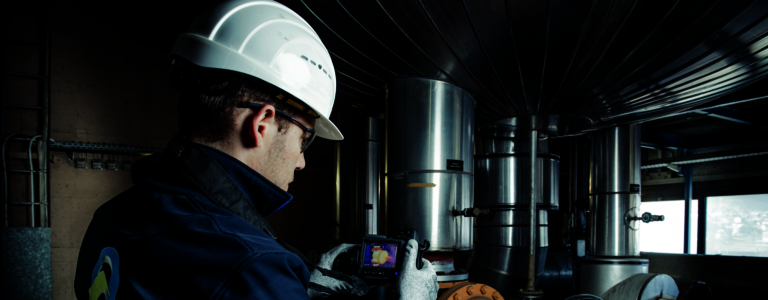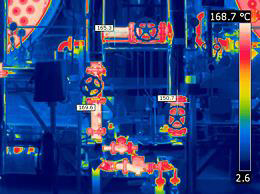- Bilfinger uses TIPCHECK procedure to detect energy losses in piping systems and plant components
- Insulation lowers operating costs and mitigates CO2 emissions by minimizing energy consumption
- Potential to significantly and sustainably reduce the environmental footprint of the industrial sector in Switzerland
Glacial melting, extreme weather events – in Switzerland as well, the consequences of climate change are palpable. Besides households and the transport sector, industry emits a large part of the CO2 released into the atmosphere, its share making up around 23 percent in 2017. Other than is the case for residential properties, the public mostly is unaware of the degree to which the insulation of industrial facilities is suited to promote an efficient use of energy and thus protect the climate. To this end, Bilfinger offers audits to determine the potential for improvement, implements the insulation measures, and subsequently provides documentary evidence of the savings achieved.
The as yet unexploited mitigation potential given in industry is significant. A study performed by the European Industrial Insulation Foundation (EiiF) shows that the annual potential savings that industrial insulation could generate in Switzerland amounts to approximately five petajoules (PJ), in other words 1,389 gigawatt hours (GWh) or, more specifically, 400,000 tons of CO2. This corresponds to the CO2 emitted by 230,000 mid-size cars with an annual mileage of 12,500 kilometers each.
According to a 2017survey on climate change performed by the association SRG, 97 percent of the Swiss population are aware of the effects of climate change. In particular in the mountainous regions, people fear its consequences such as glacier retreat, landslides, and flooding. This is in line with the results obtained by a study performed by the Bundesamt fürUmwelt (BAFU, Federal Office for the Environment) in 2018 on the implementation of environmental policy, which shows that Switzerland as an Alpine country is particularly impacted by the negative consequences of climate change.
In spite of the fact that the emission of greenhouse gas in Switzerland has been reduced by 20 percent in the period from 1990 until 2016, climate change is making itself felt: The annual average temperature has risen by 2 degrees Celsius since the beginning of temperature records in 1864, which is double the global average rate of increase. Although the industrial sector was able to reach its interim goal of mitigating its emissions by 18 percent as compared to 1990, potential for further savings remains to be unlocked.
As early as in 2010, EiiF developed a standardized program for use throughout Europe called TIPCHECK (Technical Insulation Performance Check). This allows the operators of industrial facilities to perform an energy audit in order to detect the energy losses occurring in operations. Bilfinger deploys the TIPCHECK procedure in industrial enterprises and assists them in efficiently structuring their energy utilization and in mitigating losses through insulation. In Switzerland, Bilfinger is one of the leading providers of this program.
Focusing on the “hot spots”
TIPCHECK is not just a tool serving to inspect existing insulation for deficiencies and damages. It particularly addresses the so-called “hot spots,” the uninsulated components such as flanges, fittings, or wall mounts. This is where heat is lost, and thus energy. Bilfinger identifies these heat losses using thermal imaging cameras and contact thermometers. On that basis, specific measures are suggested for improving the insulation. The program also includes a profitability analysis to ensure customers will be taking an investment decision allowing the costs to be recouped promptly and in quantifiable and demonstrable fashion.
“If you don’t have a clear understanding of the energy losses occurring in your piping systems and plant components, you are not only wasting your monetary resources, you are also causing harm to the environment. The TIPCHECK procedure significantly contributes to reducing the consumption of energy and thus reduces CO2 emissions,” is how Sven Ewert summarizes it, the technical subsidiary head for insulation technology at Bilfinger Industrial Services Schweiz. “This promotes the objective pursued by the CO2 Act in force in Switzerland, according to which the emissions of greenhouse gas on Swiss territory are to be reduced by 20 percent in 2020 as compared to 1990 levels – that is a target we fully support, as a corporate citizen and as a partner of industry, and we will make every effort to achieve it.”



